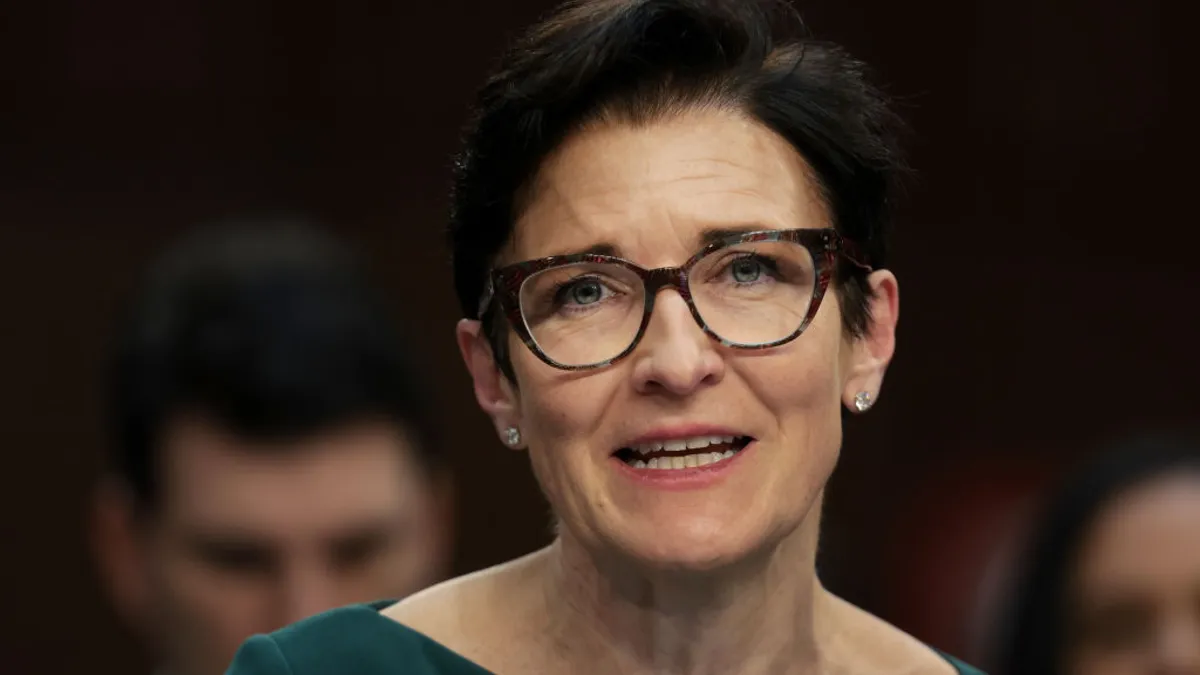Citi executives aimed to be “crystal clear” Tuesday in noting the bank is not under an asset cap – a measure Sen. Elizabeth Warren, D-MA, urged recently.
Further, executives, during the bank’s third-quarter earnings call, said they don’t expect a regulatory clampdown beyond the $135.6 million in fines Citi received from the Office of the Comptroller of the Currency and the Federal Reserve in July for failing to make sufficient progress on its data quality, risk management and internal controls flaws the agencies flagged in 2020.
The bank’s third-quarter operating expenses dipped 2% year over year, to $13.3 billion, according to an earnings release Tuesday. But alongside that, CEO Jane Fraser and CFO Mark Mason repeatedly stressed that the bank is bolstering its investments in areas where regulators have demanded faster progress.
“I and the management team remain steadfast and determined to get this transformation right and to get this done,” Fraser said Tuesday.
The bank “can walk and chew gum at the same time” in managing those dual priorities, she asserted.
Citi’s third-quarter headcount remained flat at 229,000, compared with the previous three-month span. But that’s a 5% drop from Q3 last year, when the bank revealed its plans to embark on a wide-scale reorganization by trimming headcount and eliminating layers of leadership.
Ultimately, Citi has said it aims to shrink its staff by 20,000 by 2026, although Mason said the reorganization will be done this year.
The bank continues hiring, particularly to bolster its transformation and risk and control work, “to ensure we’ve got the appropriate level of resources to get after those things the way we need to,” Mason said Tuesday.
Citi’s regulators “wanted to ensure that we were allocating enough resources in order to deliver on the plan we had committed to,” Mason said last month. Bank executives have said Citi is committed to spending whatever it takes to resolve the consent orders it’s under and strengthen risk and controls.
The bank’s massive overhaul may have hindered its ability to resolve the regulatory issues, Reuters reported Tuesday, citing unnamed sources. The resolution process has been drawn out because the bank’s risk, compliance and data staff haven’t been sufficiently skilled or trained, according to the wire service.
Citi, however, denied to Reuters that the reorganization has delayed the bank’s timeline to address the consent orders.
The lender has about 13,000 employees working to revamp its controls and systems, and thousands more supporting that endeavor, and has spent billions of dollars on the transformation effort, Reuters reported.
Citi aims to spend between $51 billion and $53 billion in 2026, down from this year’s target of about $53.8 billion, Mason said. The bank’s wealth and investment banking divisions are doubling down on employee productivity, he said, and Citi will continue to look for areas to rev up productivity if it encounters expense headwinds.
When it comes to regulatory feedback and spending, “when we fall behind in an area, we increase the investments needed,” and incorporate lessons learned, Fraser said. She rattled off a number of areas where the bank has made changes, including consolidating and retiring platforms and enhancing Citi’s stress testing capability.
She and Mason assured analysts the issues haven’t affected the bank’s clients.
“This is largely around ensuring that we improve those regulatory reports that we have to produce by starting with the underlying data that’s required to do that,” Mason said.
With most of the bank’s transformation and simplification work implemented – it wrapped up major actions in March – Citi is now focused on improving the business’s performance, Mason said.
To reach the goals it’s set, “it’ll really be around the benefits from the transformation work playing through over the medium term, the benefits from the org simplification flowing through the expense line as we’d expect, as well as the exits that are left to be achieved,” Mason said.
Citi is making “good progress on all of those fronts, but a lot of work left to be done,” he added.
The bank also continues to hire in areas like wealth and investment banking, Mason noted.
Vis Raghavan, whom Citi brought over from JPMorgan, is “very focused on how we run an integrated coverage model in banking,” across investment banking, corporate banking and commercial banking for middle-market clients, Mason said. Citi’s investment banking fees rose 44%, to $999 million, in the third quarter. By percentage increase, that outperformed JPMorgan Chase, Wells Fargo and Goldman Sachs.
Citi seeks to grow its share of the U.S. market, deepen relationships with existing customers and scale its commercial banking business in high-growth geographies, Mason said.
Additionally, “we’re looking to align talent to defend areas where we’ve been strong, but also investing in growth sectors,” he said, pointing to the bank’s recent agreement with private credit player Apollo, to establish a $25 billion direct lending program.
Citi’s quarterly net income slipped to $3.2 billion, on a 1% rise in revenue, to $20.3 billion.






















